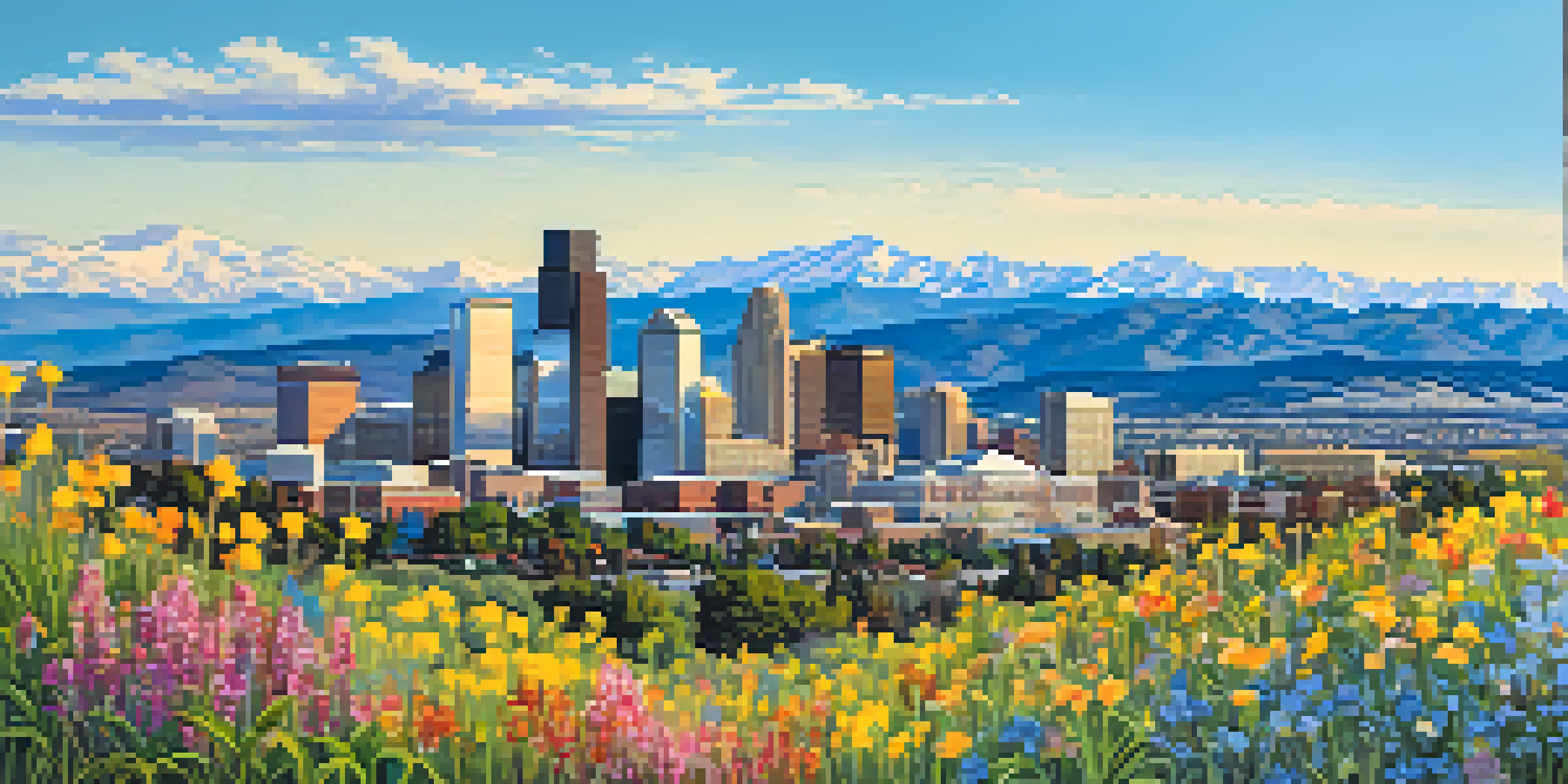Denver's Climate vs. Other Major U.S. Cities: A Comparison

Understanding Denver's Unique Climate Features
Denver is known for its distinctive climate, characterized by low humidity and abundant sunshine. Nestled at an elevation of over 5,000 feet, it experiences a semi-arid climate, which means you can expect warm summers and cold winters. With around 300 days of sunshine per year, it's no surprise that outdoor enthusiasts flock to the Mile High City.
The greatest glory in living lies not in never falling, but in rising every time we fall.
The city's elevation also contributes to its weather patterns, leading to rapid temperature fluctuations. For instance, a sunny morning can quickly turn into a snowstorm by the afternoon. This unpredictability is something both residents and visitors need to embrace when planning their day.
These climate characteristics set Denver apart from many other major U.S. cities, making it a unique place to experience the seasons. Whether it's skiing in the winter or hiking in the summer, the weather plays a significant role in the lifestyle and activities available in Denver.
Comparing Temperature Ranges Across Major Cities
When we look at temperature ranges, Denver's cool winters and warm summers offer a stark contrast to cities like Miami, which has a tropical climate. Miami's temperatures rarely dip below 60°F, while Denver can see winter lows plummet into the teens. This means that if you're looking for snow, Denver is your go-to destination.

On the other hand, cities like New York experience a wider range of temperatures throughout the year. While Denver's winters can be harsh, summers are typically warm and dry, whereas New York can feel muggy and hot. This difference can influence not just comfort levels but also the types of outdoor activities residents engage in.
Denver's Climate: Sunshine & Snow
With around 300 days of sunshine and rapid weather changes, Denver offers unique outdoor activities throughout the year.
Overall, Denver's temperature range allows for a variety of seasonal activities, from snow sports in the winter to hiking and biking in the summer. This versatility is a significant draw for those who enjoy experiencing all four seasons in a single year.
Precipitation Patterns: Denver vs. Other Cities
Denver's annual precipitation averages about 15 inches, which is relatively low compared to cities like Seattle, known for its rain-soaked climate. Seattle receives nearly 40 inches of rain each year, leading to its lush greenery and vibrant ecosystems. In contrast, Denver's drier climate means less humidity and fewer rainy days, making it ideal for those who prefer sunny weather.
In every walk with nature, one receives far more than he seeks.
However, Denver's precipitation often comes in the form of sudden snowstorms during winter months, which can surprise newcomers. These snowfalls are usually brief but can lead to beautiful winter landscapes that attract skiers and snowboarders alike. The quick melt that follows also keeps the city vibrant and green as the snow thaws.
Thus, while Denver may not have the same amount of rain as other cities, its unique precipitation patterns still create a dynamic environment. This aspect of Denver's climate contributes to its charm and allure for residents and tourists alike.
Air Quality and Its Impact on Denver's Climate
Air quality is another important factor to consider when comparing Denver's climate to other major cities. Due to its elevation and geographical location, Denver can sometimes experience higher levels of air pollution, particularly in the summer months. This is often attributable to vehicle emissions and industrial activities in the region.
In comparison, cities like Los Angeles face their own air quality challenges, but they often come from different sources, such as smog from local industries and heavy traffic. While both cities strive to improve their air quality, the challenges they face are distinct and require tailored solutions.
Altitude Affects Weather & Lifestyle
Denver's high elevation leads to cooler temperatures and increased UV exposure, shaping the city's outdoor-focused lifestyle.
Despite occasional air quality issues, Denver remains a desirable location for many due to its outdoor lifestyle and beautiful scenery. The city has made significant strides in recent years to address environmental concerns, ensuring that residents can continue to enjoy the natural beauty that surrounds them.
Seasonal Changes: What to Expect in Denver
Denver experiences vibrant seasonal changes that can be a highlight for many residents. Spring brings wildflowers and mild temperatures, while summer invites outdoor activities with warm days perfect for hiking in the Rockies. Fall showcases stunning foliage, making it a picturesque time to explore the city's parks and surrounding areas.
In contrast, cities like New Orleans have a more consistent climate year-round, with less pronounced seasonal changes. While this can be appealing to those who prefer a more stable environment, it also means missing out on the unique experiences that each season offers in Denver.
Winter in Denver transforms the city into a winter wonderland, attracting ski enthusiasts from all over. The ability to enjoy different activities throughout the year is a big part of what makes Denver's climate special and appealing to a diverse range of people.
The Role of Altitude in Denver's Climate
One of the biggest factors contributing to Denver's climate is its altitude. At over 5,000 feet, the city is one of the highest major cities in the U.S., which affects everything from temperature to precipitation. Higher altitudes typically result in cooler temperatures, especially during the winter months.
Moreover, the elevation can lead to increased UV radiation, so residents need to be mindful of sun protection, even on cloudy days. This is a significant shift for those coming from lower-lying areas where UV exposure is less intense. Staying hydrated is also crucial, as the air is drier and can lead to dehydration more quickly.
Seasonal Variety in Denver
The distinct seasonal changes in Denver provide residents with diverse recreational opportunities, from skiing in winter to hiking in summer.
In comparison, cities like Chicago sit at a much lower elevation and have different climatic features. The altitude in Denver not only shapes the weather but also creates a unique lifestyle for those living in the city.
How Denver's Climate Affects Lifestyle Choices
The climate in Denver has a profound impact on lifestyle choices for its residents. The abundance of sunshine encourages outdoor activities throughout the year, from skiing and snowboarding in the winter to hiking and biking in the summer. This active lifestyle is a core part of Denver's culture and identity.
In contrast, cities with more extreme weather patterns, like Minneapolis, might see residents spending more time indoors during the winter months. In Denver, however, the city's infrastructure supports outdoor living, with numerous parks and recreational areas available for residents to enjoy year-round.

Ultimately, the climate shapes not just the activities people engage in but also the community as a whole. The emphasis on outdoor living and recreation fosters a sense of connection among residents, making Denver a vibrant and dynamic place to call home.